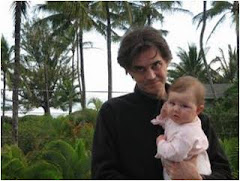The inspiration for this entry is a forthcoming book by Kathryn Schulz. The subject (and title) of the book is Being Wrong (http://www.amazon.com/Being-Wrong-Adventures-Margin-Error/dp/0061176044/ref=sr_1_3?ie=UTF8&s=books&qid=1259126217&sr=8-3 ) Recently, I had the chance to talk with the author, and she was nice enough to send me an advance copy of the book, which is both wonderfully written and brilliantly insightful. That conversation (and the book) led me to put this on my list of leadership-issues-that-we-don’t-discuss-enough.
Schulz begins with a general overview of the issue of Being Wrong. As a reader, you kind of have to ease into it: At first you think, “Sure, I know all about being wrong… I make mistakes all the time.” But then, as you are reading the anecdotes and analyses about the topic, you realize that the issue is not about being wrong, but rather about admitting to being wrong. And then you start to think, “How many times have I had trouble with admitting I was wrong? How many times did I fail to see that I was wrong because I was uncomfortable admitting it to myself? How many times have I known it myself but been embarrassed to admit it to my colleagues, friends, or loved ones? How many times have I continued to argue a point just because I was uncomfortable saying, 'Wait a second, I see your point now; let me revise everything I have been arguing for over the last hour'?” When you start to understand this aspect of the book—and start to see yourself in this light—it starts to get delightfully uncomfortable. And this is an issue that extends well beyond human psychology. It is an issue that is deeply embedded in our culture, as Schulz notes: “As a culture, we haven’t… mastered the basic skill of saying ‘I was wrong.’ This is a startling deficiency, given the simplicity of the phrase, the ubiquity of error, and the tremendous public service that acknowledging it could provide.”
The book does a wonderful job covering territory from research to anecdotes; from neuroscience and psychology to philosophy and religion; ontology; there are so many ways to think about wrongness in our lives. In this book you will find wonderful personal anecdotes about being wrong (and failing to see it) but also in-depth analyses of the research on the psychology of being wrong (and why it’s so difficult to see or admit it).
But what struck me most was the wonderful application for thinking about leadership and organizational effectiveness. Why is it so difficult to be wrong? What is it about the experience that makes it feel so uncomfortable? And how does being right and wrong relate to leadership? I am always stunned by the aversion to admitting folly in the business world. Some of the examples are obvious: Watching Hank Greenberg preen in the media (and blame his successors), it seems inconceivable that he would ever admit that anything that went wrong at AIG had anything to do with him. And following the travails of the New York Times, it seems more likely that Sultzburger would rather go down with the ship than admit to a mistaken vision. Or my favorite example: during one of the 2004 Presidential debates (one of the ones with a town hall format), an audience member stood up and asked John Kerry the following question: could you give us an example of some time when you have been wrong about something. I remember seeing with such clarity that the questioner was asking the question as a measure of character. In a campaign in which two candidates continually threw mud at each other for all the mistakes “their” side had made, the questioner seemed to be wondering was Kerry the type of man who could admit mistakes or was he, like Bush, the type of leader who would never back down, never admit that maybe he had made an error in judgment. The questioner was literally giving Kerry a chance to show that he could be a bigger and better leader than Bush could ever be just by showing right here and right now that he wasn’t afraid to admit he had been wrong about things. Kerry not only swung and missed; he didn’t even understand the question that was being pitched. He immediately launched into an answer about how “his side” had not been wrong about the war; that Bush’s team was the group that deserved blame; and he spent his 90 seconds recounting (once again) all of the ways that the Bush Administration had been wrong. I remember thinking right that that Kerry was going to lose the election. This person had been looking for some differentiating style, and Kerry had shown that he was actually not all that different from George W. Bush in his leadership style. I remember thinking: “what was he afraid of? Was he afraid of a media blitz the next day with headlines reading ‘Kerry admits he has been wrong!’”
More troubling are the less known examples I have encountered (more troubling, in part, because they are less public and thus, perhaps, less at stake in the admission of being wrong). Early in my career, I remember working with an individual who had great difficulty in admitting error. He was exceptionally intelligent, hard working, and quite charismatic (all qualities that make a person used to being able to convince people that s/he is right). But it was fascinating to watch him in the organizational context. He would consistently undercut the loyalty people had to him by always seeming just a little reluctant to shoulder the burden of his part of the blame in some circumstance or mishap. I remember thinking at the time, something that Keith Reinhart (the former CEO of DDB Worldwide and one of my favorite leaders) would say to me years later: “people respond to leaders who give credit to their team for success and take responsibility upon themselves for failures.” More recently, I remember one discussion with a managing partner of an organization I was working with that was struggling with growing pains in his organization. I had done a number of interviews with junior people in the firm and was set on having a candid conversation with this individual. He seemed up for it: he was one of the most thoughtful and insightful leaders of an organization I had ever met and he had asked for my advice on the issues. Yet, the defenses flew up at my first suggestion that some of the tension in the organization was of his own doing. I remember him saying, “Do you think you are telling me anything I don’t know? I know everything that is going on in this organization.” I remember thinking this was so interesting: if this guy can’t hear the truth and admit some fault of his own, I don’t know who is going to be able to.
I also see this all the time in Executive and MBA classes. There are a couple of cases that I often use to illustrate this point—to begin conversations on how leaders should handle situations in which they have clearly messed up. I am always amazed how many students (the majority) consistently argue for not openly admitting mistakes. The argument is usually something like: if you are too open with your mistakes, your employees (or team or whatever group you are leading) will respect you a little less, trust your vision and instincts a little less, believe in your leadership a little less. And this is just the analytical side of the conversation.
There is surely another layer here where people in leadership positions just have a difficult time admitting that they are wrong. Really it’s not that surprising from an individual perspective. The ego structure of people who rise to the top of organizations is such that, the more confident you are, the surer of yourself you are, the more successful you are likely to be. As I noted in my first example above (the early career example), people who have a high level of intelligence, a high self opinion, success in convincing people of their vision are not surprisingly predisposed to be reluctant to admit mistakes or failure. Conversely, if you are in constant doubt, you are probably less likely to aim high and thus probably less likely achieve at the highest levels.
While we are almost always taught, especially among leaders or aspiring leaders, that you should hide your weaknesses and hide your mistakes—lest you look week or inadequate in front of your minions—this view is mistaken. And even if we are taught this less than I think, most executives I have worked with over the years (at least among those with whom I have brought this up) will admit (after some prodding) that they do indeed have a difficult time admitting that they are wrong or that they made some mistake. This is problematic when it comes to leadership as it actually undercuts legitimacy in general and it fails to capitalize on the power that can come from being wrong. It is not only good to admit you are wrong when you are; but it can also be a powerful tool for leaders—actually increasing legitimacy and, when practiced regularly, can help to build a culture that actually increases solidarity, innovation, openness to change, and many other positive features of organizational life. Thus, while leaders often seem to think that admitting error is a sign of weakness and an open door for allegations of illegitimacy, so often the opposite is true. What is more powerful than an individual who is able to stand in front of his or her minions and admit that the failure was his? What better way to gain the respect and admiration of your team than to take the blame and responsibility on yourself rather than calling out someone on your team?
Schulz ends her treatise with a wonderful chapter on the beauty of wrongness. The chapter truly pushes the boundaries of how we think of this issue. Error is tied to individual identity: the important issue, as Schulz notes, isn't that "we must be wrong from time to time; it's that we can be wrong. Alone among the creatures of the world, we can hatch crazy ideas, pursue pipe dreams, speculate wildly, keep faith with even the most far-fetched fantasies. Sometimes these notions flourish and bear fruit, sometimes they collapse. But unlike androids, we humans do not normally self-destruct in the face of our mistakes. On the contrary: we self-create, and self-recreate." As Schulz convincingly argues by the end of the book, wrongness is tied to risk taking and innovation; it is tied to exploration; it is tied to belief and self-belief; and the courage to pursue all of these opportunities. One of the greatest lessons leaders and aspiring leaders of organizations might learn is the beauty and opportunity of being wrong.





